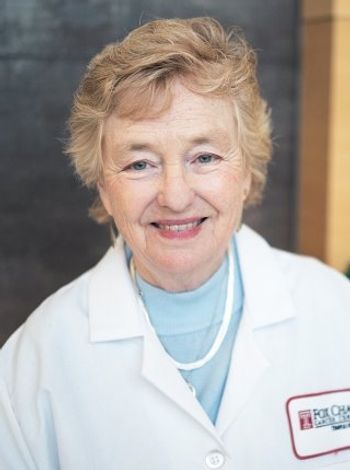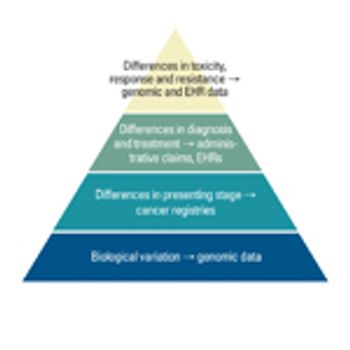
The combination of pembrolizumab and trastuzumab showed promising clinical benefit in patients with trastuzumab-resistant HER2-positive advanced breast cancer who express PD-L1, according to a new study.

Your AI-Trained Oncology Knowledge Connection!


The combination of pembrolizumab and trastuzumab showed promising clinical benefit in patients with trastuzumab-resistant HER2-positive advanced breast cancer who express PD-L1, according to a new study.

A study found no difference in outcomes between 2 and 5 years of treatment with zoledronate after chemotherapy in early breast cancer patients, suggesting the longer duration may not be necessary.

Traditional neoadjuvant chemotherapy along with dual HER2-targeted blockade yielded significantly better response rates than a novel approach using HER2-targeted chemotherapy plus HER2-targeted blockade, according to a randomized phase III trial.

The FDA approved a biosimilar for trastuzumab, Ogivri, for the treatment of patients with HER2-positive breast and stomach cancer.

The OncoArray Consortium, an endeavor involving 550 researchers from 6 continents, identified new target genes that may allow for better definition of the pathways and mechanisms underlying breast cancer susceptibility.

In this interview with Mary Daly, MD, PhD, she gives an overview of multigene panel testing for breast cancer, and how they can be used by clinicians to interpret risk and treat accordingly.

An intermittent schedule with extended adjuvant letrozole did not improve disease-free survival in postmenopausal breast cancer patients.

A 5-year follow-up analysis showed that 1 year of extended adjuvant therapy with neratinib, given after chemotherapy and trastuzumab, can significantly improve rates of clinically relevant relapses in women with HER2-positive breast cancer.

Duloxetine resulted in reduced AI-associated musculoskeletal symptoms compared with placebo in women with early-stage breast cancer.

In this Q&A we discuss the role of PARP inhibitors in cancer treatment, their role in triple-negative breast cancer patients and look forward to ongoing trials in this setting.

Even after 5 years of adjuvant endocrine therapy, women with ER-positive breast cancer experienced a steady rate of recurrences for as long as 20 years.

An intense dose-dense chemotherapy approach offers better survival vs standard therapy, extending to 10 years in breast cancer patients with extensive lymph nodes.

Adding trastuzumab to anthracycline and taxane-based chemotherapy does not result in worsening of long-term cardiac outcomes in patients with node-positive, HER2-positive early breast cancer, according to a new study.

Researchers have developed nanoparticles that can carry targeted therapy to tumors with bone metastases, which may have particular benefit for breast cancer patients.

For African-American women with triple-negative breast cancer, high levels of tumor infiltrating lymphocytes may mean a better prognosis.

Extended AI did not improve disease-free survival for all HR-positive breast cancers; however, certain high-risk patients may benefit from therapy beyond 5 years.

Women with early breast cancer have varying outcomes with zoledronic acid treatment depending on MAF positivity, according to the AZURE trial.

Selection of more aggressive treatment options for breast cancer led to substantial employment disruptions among working patients, according to the results of a recent study.

A new randomized trial found that neoadjuvant trastuzumab/pertuzumab alone yields a substantially worse rate of pathologic complete response compared with paclitaxel plus the two anti-HER2 agents for women with early HER2-positive breast cancer.

We will provide a brief orientation on the research that has defined our understanding of breast cancer disparities to date, as well as promising emerging data sources and methods that may take us further in the quest to close the racial survival gap and provide better cancer care to vulnerable populations.

This article reviews the mechanisms of sexual dysfunction that occur after breast cancer, offers some practical guidance on how to discuss this effectively with patients, and reviews the data and recommendations for optimizing management.

Women who take multivitamin supplements before their breast cancer diagnosis and during chemotherapy appear to be less likely to develop the debilitating, often long-lasting symptoms of chemotherapy-induced peripheral neuropathy, according to a new study.

The FDA has granted Priority Review status to pertuzumab (Perjeta) for the treatment of HER2-positive early breast cancer. The FDA will review the agent in combination with trastuzumab and chemotherapy, for use in the adjuvant setting.

From 1989 to 2015, breast cancer death rates decreased by 39%, according to findings from a report from the American Cancer Society. This decrease translates to well over a quarter of a million averted breast cancer deaths in the United States.

Dr. Judy Garber offers further perspective on the topic of PARP inhibitors in triple-negative breast cancer, which she presented in an education session at 2017 ESMO.